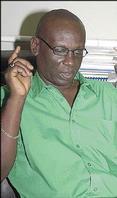By John Myers Jr., Staff Reporter 
Mckenzie
IN AN effort to safeguard against an outbreak of diseases, the Kingston and St. Andrew Corporation (KSAC) said the operations of massage parlours are to come under intense scrutiny.
Kingston's Mayor and chairman of the KSAC, Desmond McKenzie last week expressed concern about the possible health risks posed by the proliferation of massage parlours across the city.
"A lot of these massage parlours that are operating don't just offer massage alone ...we cannot wait until we have a major outbreak (of diseases) then we move to correct these problems," he said. "We must start from now. A lot of the practices that we understand take place there are not activities that as a local authority we can close our eyes to."
One massage parlour owner who said his establishment catered only to business and professional clientele, revealed that he earned between $8 and $10 million per year in profits.
He said the potential existed for them to make much more.
'GREAT DEAL OF PROBLEM'
Dr. Herb Elliot, chief public health officer in the Ministry of Health, noted in an interview with The Sunday Gleaner, that with the proliferation of massage parlours, there was a problem in differentiating legitimate establishments that were carrying out legitimate services from the others that were carrying out nefarious activities.
He said his department did not have a problem with the business of offering massages by itself, as long as operators adhered to strict public health standards.
However, "with the nefarious ones, there is a great deal of problems because we suspect...some are upfront for illicit sex, therefore it would present a public health problem," he explained.
In addition, he pointed out that this type of service was against the law and would create a haven for the transmission of diseases such as hepatitis and sexually transmitted infections (STIs) such as gonorrhea, trichomoniasis, chlamydia, and HIV/AIDS, among other things.
"We do not know if they are stressing safe sex in those places that have crossed the line and we do not know if the sanitation of the place or the general condition of the place is up to standard," Dr. Elliot pointed out.
He noted that the Public Health Department visited some of these establishments and found that "the toilet facilities were not up to standard, (also) they were not sufficient for both customers and staff and there was not sufficient wash basins."
But he noted that his department, however, was facing a dilemma in terms of determining whether or not sex is offered as "we have to go upfront, we can't go undercover, the police can but we can't."
The Public Health Chief was cautious, however, in submitting that the proliferation of massage parlours was contributing to the high STI infection rate among the population as he said no proof exists as to their modus operandi.
Apart from the health concerns, Town Clerk Errol Greene explained that the operation of these massage parlours in residential areas were contributing to traffic congestion in these communities, much to the chagrin of residents.
"One of the concerns from residents is the heavy traffic that it (massage parlour) attracts in certain areas, the long hours sometimes that persons coming and blocking other persons driveways," he said. He noted that residents were also concerned about undesirables coming into their communities as a result of these businesses.
"There are other concerns as to cleanliness, as to whether or not persons are licensed or qualified to carry out the type of activities they are carrying out," Mr. Greene said.
Currently, massage parlours are not required by law to obtain a license to operate.
As a result, the KSAC said, in the next couple of weeks, it will be moving to scrutinise the operations of these establishments to regulate the type of services offered to safeguard against the public health risks.

































